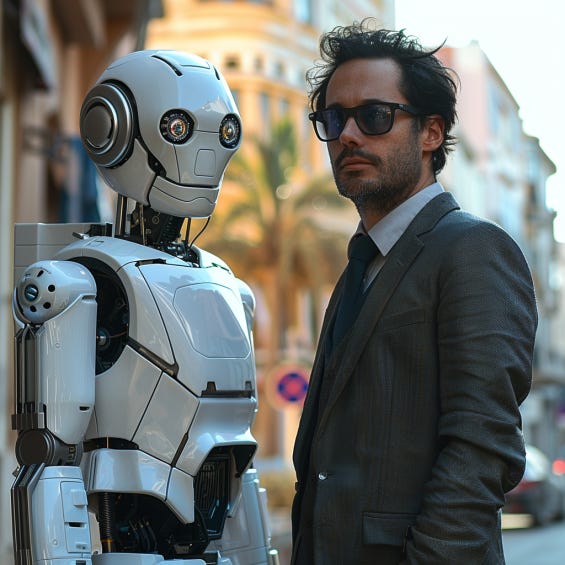Would You Hire a Robot as Your Co-founder?
Hey there, Happy Tuesday! We’re one step further into the week, and each step counts. Stay focused, keep pushing, and remember - it’s not about how fast you go, but that you keep going. You’re doing great!
Believe you can and you’re halfway there
When you believe in your potential, you’re more inclined to take the necessary steps to achieve your goals. It serves as a reminder that your mindset is a powerful motivator. Overall, that belief in yourself is a crucial part of the journey to success. It can empower you to take action, remain persistent, and ultimately achieve your goals.
🎯 Top Headlines of the Day
Tata plans to generate 500,000 manufacturing jobs over the next 5 years
Wipro Q2 FY25 preview: Revenue expected to decline up to 3% YoY
SpiceJet resolves $23.39 million dispute with Aircastle
📊 Market Pulse
Today’s top-performing stocks are:
Today’s low-performing stocks are:
Choosing between a robot and a human
Let’s talk about something that might sound a bit sci-fi but is actually becoming more of a reality: hiring a robot as your co-founder. I know, I know—sounds wild, right? But as technology zooms ahead, especially in the world of AI and robotics, it’s worth considering whether having a robotic sidekick in business could be a game-changer.
The Rise of AI in Business
First off, let’s look at how AI is already making waves in our daily business operations. From chatbots handling customer queries to algorithms analyzing data for marketing strategies, AI is stepping up its game. Imagine having a co-founder who could sift through all that data, spot trends, and make recommendations. Suddenly, it doesn’t seem so far-fetched, does it?
A robot co-founder could take care of those tedious tasks—like crunching numbers or forecasting sales—while you focus on the fun stuff: coming up with innovative ideas and connecting with your team. Sounds like a win-win!
Advantages of a Robotic Co-founder
Consistent Performance:
Robots don’t have off days. They can maintain a steady level of performance, ensuring that your operations run smoothly. They won’t let emotions cloud their judgment—something we humans sometimes struggle with! And we all know those days when motivation just doesn’t hit the mark.Enhanced Collaboration:
Picture this: a robot co-founder that works seamlessly with your team, analyzing project data and providing real-time feedback. They could facilitate brainstorming sessions, offer fresh perspectives, and help the team stay on track. It’s like having a super helpful teammate who’s always ready to jump in.Risk Assessment:
Robots can analyze risks with precision. By evaluating historical data and current trends, they can identify potential pitfalls before they become issues, allowing you to make proactive decisions. It's like having a crystal ball but way cooler (and more data-driven).Innovation Catalyst:
What if your robot co-founder could suggest innovative ideas based on emerging trends or gaps in the market? With their ability to process vast amounts of information quickly, they might spark inspiration that leads to your next big breakthrough. Imagine bouncing ideas off a machine that can think outside the box!Customer Insights:
Robots can track customer behavior and preferences more efficiently than we can. Your co-founder could analyze purchasing patterns and feedback to suggest product improvements or new offerings that resonate with your audience. It’s like having a direct line to what your customers really want!
Challenges and Limitations
Of course, it’s not all smooth sailing. Here are a few challenges to consider:
Lack of Emotional Intelligence:
While robots can analyze data, they can’t pick up on human emotions or subtle social cues. This could complicate team dynamics and client relations, where empathy and understanding are key. We all know that business isn’t just about numbers—relationships matter!Ethical Considerations:
The question of accountability is significant. If a robot makes a poor decision, who takes the blame? As we integrate AI more into business, we’ll need to establish clear ethical guidelines around responsibility. And let’s be real—nobody wants to explain to their investors why the robot made a bad call.Resistance to Change:
Many people still harbor doubts about working alongside robots. There’s a fear of job loss or losing that personal connection in the workplace, and changing those perceptions will take time and effort. We might even find ourselves saying, “Hey, I still want to have coffee breaks with my human co-founder!”Complexity of Integration:
Integrating a robot into your business isn’t a one-and-done deal. It requires careful planning, ongoing maintenance, and possibly significant investment, which might not suit every business model. Plus, tech hiccups are a real thing—ever tried troubleshooting a tech issue during a crucial meeting?Dependence on Technology:
Relying too heavily on a robotic co-founder could lead to vulnerabilities. If the technology fails or faces a cyberattack, your operations might be compromised. It’s essential to have backup plans and not put all your eggs in the robotic basket.
Where does that leave us? While the idea of hiring a robot as a co-founder might seem unconventional today, it’s a conversation worth having.
That’s it for today, folks! We will be back again tomorrow with more valuable insights about ‘Bharat in Business.’ Till then, stay informed!





